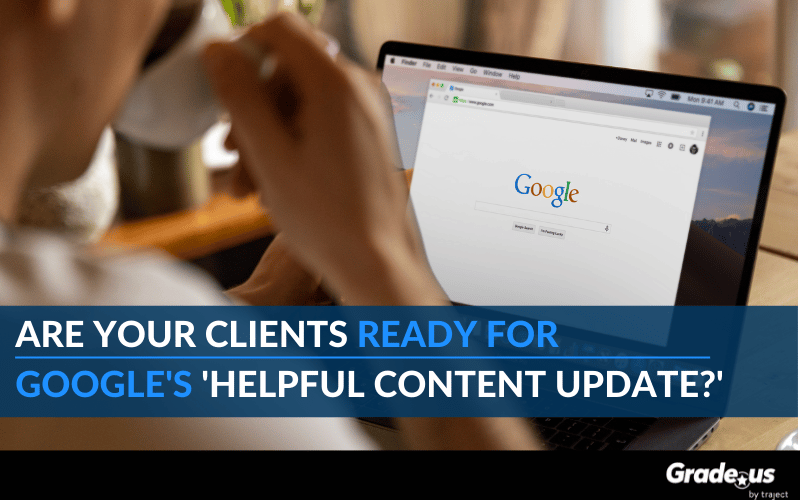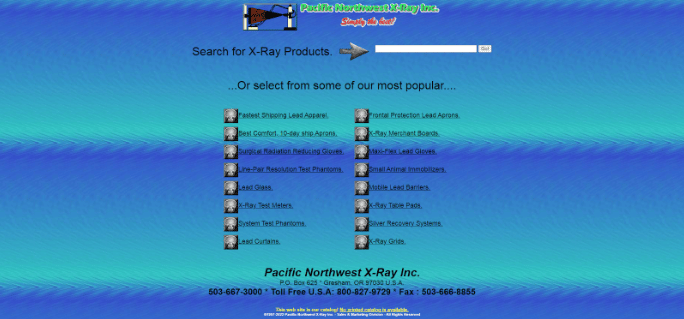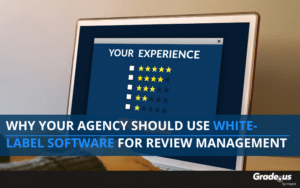It’s the end of the line.
On August 22nd, 2022, Google began rolling out its Helpful Content Update. It’s an ongoing effort by Google to reward sites that are genuinely helpful (and punish those that aren’t).
Sounds great, right?
It may not be for your agency clients. Here’s the thing, Google’s reward system has changed. Sites that fall in line with this new update will receive the lion’s share of the rewards – better rankings, more visibility, and excellent click-through rates.
Why agencies and clients should care about the Helpful Content Update
Google defined its goals and stated why this update is being applied.
“This is an ongoing, automated, sitewide ranking signal that’s designed to separate content that’s objectively helpful to searchers vs. search engine first content that places people second. According to Google, “the helpful content update aims to better reward content where visitors feel they’ve had a satisfying experience, while content that doesn’t meet a visitor’s expectations won’t perform as well.”
What do they mean?
Well, let’s imagine that your agency has two clients in the sportswear industry.
XYZ Corp. creates content that reads like this:
“We make the best long sleeve compression shirts for men, and the best long sleeve compression shirts for women. We also make compression shirts for kids. Check out our name brand and discounted line of compression shirts and pants.”
ABC Corp. creates content that reads like this:
“Looking for compression clothing? Let us help!
- Learn how to choose compression clothing that flatters your physique
- Check out our sizing guide (sizing is a bit different for compression clothing)
- Shop/sort by size, color, brand, price, gender, and more
- Get 1-on-1 help from our personal shoppers in 30 seconds or less.”
Okay.
Now imagine that you’re a parent shopping for your son or daughter. You’ve just enrolled them in a Brazilian Jiu-Jitsu class. They’re excited and want to fit in with their friends. You’re unsure which brands are sub-culture approved, and you don’t want your kids to be the odd ones out because you got the wrong brand.
What do you do?
If you’re like most parents, you’ll probably shop with Client B.
Why?
Because you’re far more likely to get the help and support you need, shopping with them means you’re going to purchase the right products for your kids, and they’re going to step into their gym looking like they belong.
This is what Google wants.
Google wants to reward content that’s made for people first, search engines second. They want your content development to prioritize people and their concerns first.
That’s bad news for most of your clients.
Your clients aren’t helpful, which is bad for business
You know the ones.
These clients are over-reliant on a specific marketing channel – they’re heavily invested in paid search or paid social, or there’s a strong emphasis on display ads. They’re dead-set on doing things their way. They have a specific approach or point-of-view and they fight you tooth and nail.
They treat organic search as an afterthought.
They don’t give SEO the respect it deserves; they repeatedly resist your efforts to steer them in the right direction and refuse to see the writing on the wall.
This is no good.
Small and medium enterprises (SMEs) have this habit of trying to manipulate Google to quickly and cheaply boost rankings and visibility.
Google sees you.
If your clients exhibit any search engine first warning signs, they’re in trouble. Okay then, what are the warning signs of a search engine first approach? If your answer to any of these questions is ‘Yes,’ there’s a good chance you’re operating with a ‘search engine first’ approach. Again, this is straight from the source.
- Is your content created for people or to earn rankings and lure people from search engines?
- Are you creating lots of content or covering various topics to improve your visibility or rankings in Google’s search results?
- Do you rely on AI content or automation services to create content across various topics?
- Are you mainly summarizing what others have to say without adding much value?
- Are you newsjacking (writing about trending topics you otherwise wouldn’t cover) in hopes of capturing additional traffic from breakout topics?
- Do readers leave your site in search of better information from other sources?
- Do you stick to a particular word count (i.e., 1,500 words) because someone told you that Google prefers word counts over _____ words? (They don’t).
- Are you covering a topic or niche to get search traffic, even though you don’t have any real expertise, authority, or trustworthiness in that domain?
- Is your content clickbait? Does it fail to deliver on its promise to readers? (e.g., answers a question that has no answer, a product, movie, or TV show release date when one hasn’t been announced)?
Here’s why this is bad news for your agency.
- Clients who produce search engine first content development will be penalized
- If clients refuse to listen to your advice, the penalties will get worse
- Your agency will receive the lion’s share of the blame (owners or shareholders will accuse you of negligence or poor performance)
- Clients will either (a.) change for the better to fall in line with Google’s policies or (b.) drop organic search altogether
- Clients who resist this update will see sharp decreases in rankings, visibility, traffic, and conversions, making organic search unprofitable over the long term
- Eventually, these clients will leave in an effort to save face. It’s much easier to find another agency than it is to admit they were wrong and refused to listen
- Confused or delusional clients may leave negative reviews for your agency or badmouth you to competitors and colleagues, making it harder to attract new clients in their industries
There are hundreds of thousands of legitimate businesses that still look like this:
There’s a neverending stream of SEO horror stories:
- At one company, “developers blocked Googlebot by IP address because of suspicious crawling activity”
- Another company received a manual penalty from Google due to the 4,000 duplicate content EMD domains they put up
- How about this gem? “I was once in an SEO role at a very large organisation and discovered the terms of service (TOS) on the website did not allow people to link to content. This company would actively send cease and desist letters when they got new links”
- Then there’s this “We don’t disavow bad backlinks because that highlights to Google there may be bad links on that site”
It probably isn’t this bad for your clients.
But it’s common for agencies to work with clients who, for whatever reason, refuse to listen to your advice regarding organic search. If you’re dealing with clients like this, you have a few options.
- Get your clients to see the light. Use our agency playbook or a win/win service like review management to achieve quick wins and get your client on board.
- Build trust with consistent results. The easiest way to do this is with a pay-per-lead campaign where your clients only pay for results. If they depend on you for leads, they’re more likely to listen to reason when you make search recommendations.
- Stabilize revenue using other marketing channels first. If your client is redlining financially, they need results now. The possibility of significant gains in 2 to 6 months (if they’re exceptional) isn’t going to motivate them. You’ll need to achieve immediate financial wins, and the best way to do that is with paid channels. This is great news because…
- Use paid search to sell clients on organic search. Organic search is an easier sell if you’re running paid search campaigns profitably. A properly managed account will have performance data – which keywords consistently lead to conversions, attract predatory customers, produce the greatest number of upsells, etc. This is compelling data you can use in your pitch to sell clients on the benefits of working with Google.
All of this work for Google’s latest update?
Absolutely.
Why the Helpful Content Update requires your client’s immediate attention
Google has been telling us to focus on people first for y-e-a-r-s.
They brought this up repeatedly via Panda, Core Updates, and changes like E-A-T, mentioning that they want us to focus on people first.
So… what does non-compliance mean?
These automated changes are bad news bears for agency clients who decide to play hardball with Google. These search engine first publishers should expect a decrease in rankings, visibility, and search engine traffic. Google tells us why.
“This update introduces a new site-wide signal that we consider among many other signals for ranking web pages. Our systems automatically identify content that seems to have little value, low-added value or is otherwise not particularly helpful to those doing searches.
Any content — not just unhelpful content — on sites determined to have relatively high amounts of unhelpful content overall is less likely to perform well in Search, assuming there is other content elsewhere from the web that’s better to display. For this reason, removing unhelpful content could help the rankings of your other content.
This classifier process is entirely automated, using a machine-learning model. It is not a manual action nor a spam action. Instead, it’s just a new signal and one of many signals Google evaluates to rank content.”
This is all automated.
If Google brands your client’s site as low-quality, they will see significant decreases over time. What’s worse, they’ll need to make substantial changes to recover.
Google has just punished your local clients. Can you help them recover?
Local search, organic search, it really doesn’t matter.
If your clients want to recover, here’s what Google says they’ll need to do to create people-first content.
“By following our long-standing advice and guidelines to create content for people, not for search engines. People-first content creators focus first on creating satisfying content, while also utilizing SEO best practices to bring searchers additional value.”
You’re doing great if you can answer ‘Yes’ to each of the questions below.
- “Do you have a target audience for your business or site? Would they view your content as useful if they came to you?
- Do you demonstrate first-hand expertise and a depth of knowledge (e.g., expertise from using a product or service)?
- Does your site have a primary purpose or focus (e.g., inbound marketing, architecture, life insurance, etc.)?
- Do searchers leave your site feeling they’ve learned enough about a topic to help achieve a specific goal?
- Will your readers leave your site feeling they’ve had a satisfying experience?
- Do you rely on Google’s guidance for core updates and product reviews?”
Well, that seems easy enough.
Isn’t this the sort of thing businesses are already doing?
Not really.
Spammy, unhelpful content that fails to answer searcher questions, duplicate content, crawl budget issues, no index tags, issues with core web vitals, whew! You’d be surprised at the number of issues clients have with their web pages.
Ha! No, you wouldn’t.
You know exactly what I’m talking about. You’re running an agency; you deal with this all of this on the regular. This is no surprise to you, lol. I dealt with the very same issues for 15 years. This is exactly why your clients need help. You know some of your clients aren’t ready: they’re about to see their business crushed by an algorithmic update.
That means a decrease in revenue for your agency.
Get your clients ready for Google’s Helpful Content Update
The days of keyword spamming are long gone.
Today, Google automatically filters out low-value, search engine first content. People first content is the priority. Google’s update will reward your clients with rankings, visibility, and traffic, so long as they see you’ll take care of the searchers they send your way.
The People first approach works in the short and long term.
Build your content strategy around people first, and you’ll find the Helpful Content update leads to increased rankings and consistent traffic. SMEs have a habit of trying to manipulate Google – anything to quickly and cheaply boost rankings, visibility, and traffic. Don’t let them talk you into it.
Google sees your clients.
Protect your clients from themselves and you’ll find your clients and your agency will reap significant and consistent rewards from Google over time, no search engine manipulation required.









